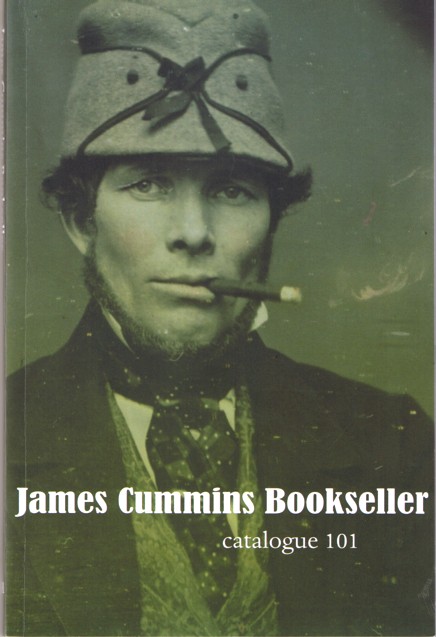Literature and Americana from James Cummins Bookseller

Literature and Americana from James Cummins Bookseller
By Michael Stillman
James Cummins Bookseller recently published Catalogue 101. This selection of 280 items is divided into three segments: 20th Century Literature, 18th and 19th Century Literature, and Americana. This includes many items from names you know well, particularly among the literary works, with a few that are obscure, but perhaps witnessed important events. Here are a few of the 280 items we found in this new catalogue.
Item 162 describes an invented land, discovered by an imaginary traveler: Amazonian Republic, Recently Discovered in the Interior of Peru, by Ex-Midshipman Timothy Savage. This work by an unknown author was published in 1842, and has been described by some as the first American feminist fantasy. The book starts out as if it might be real, with "Savage" traveling from Lima inland, where he is captured by Indians, then rescued by the "Amazons." His strong rescuers are, naturally, women, based on earlier serious beliefs of Amazon tribes headed by large, powerful women. As the book develops in its description of the government of the Amazons, it becomes clear that it is a satire of governmental institutions in the United States. $800.
Here is a book by a strong woman who was also quite real: Mae West. West was not a natural beauty, but created such a sexy image that no one noticed. To generate such a role for herself onscreen, she wrote a script in which to feature her charms. It first appeared, with her in the leading role, on Broadway. She then converted the playscript into a novel, Diamond Lil. A Powerful New Novel of the Underworld. This is that novel, published to go along with the film, renamed She Done Him Wrong, which featured West, Cary Grant, and Noah Beery. It was nominated for an Academy Award as Best Picture in 1932. Item 70. $750.
Item 167 is an archive of over 40 letters from Harriet Beecher Stowe's daughter, Georgiana "Georgie" Stowe Allen to her husband, Rev. Henry Freeman Allen. Georgie was playful and mischievous, but also subject to mood swings and depression. She is said to be part of the inspiration for her mother's character of Topsy. Perhaps she, too, grew like Topsy. She ended up having a very difficult life, becoming addicted to morphine after receiving it during childbirth, and never was able to overcome her addiction. She died as an invalid at the age of 44, her mother by her side. These letters were written to her husband over two decades, at times when he was away, and they reflect both the excitable and darker sides of her life. They also contain numerous references to her famous mother. $3,000.
The first issue is generally the most desirable, but here is a last issue that is perhaps the most notable of all. Harriet Beecher Stowe would certainly have appreciated this moment. It is the last issue of William Lloyd Garrison's The Liberator. Garrison was the fiery abolitionist who spent decades agitating for an end to slavery. He began publishing his journal in 1831, and it would make him one of the most hated men in the South. That didn't bother Garrison, who continued publishing it for the next 35 years. However, by December 29, 1865, when this last edition was published, it was needed no more. Slavery had been abolished, and the Civil War won. Liberation was achieved. Garrison signs off with a "farewell" written by African-American abolitionist William Cooper Nell, along with his own valedictory, and a discussion of the pending constitutional amendment which would outlaw the evil institution once and for all. Item 222. $1,000.